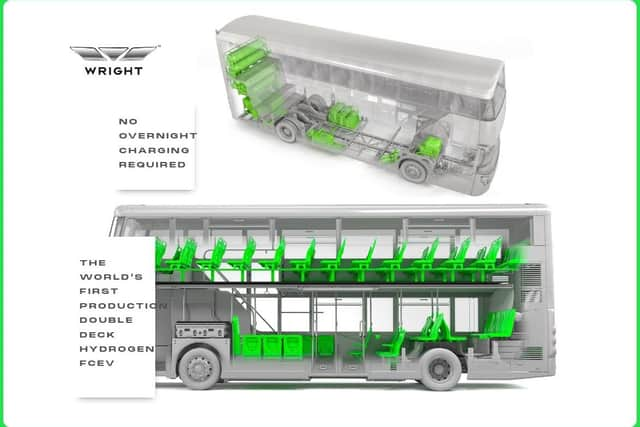Commons told UK government should follow mantra 'buy British’ for its buses so work goes to firms like Wrightbus instead of Communist China
and live on Freeview channel 276
A debate in the House of Commons late on Monday night was told that, rather than plumping for UK-engineered vehicles such as those made by Wrightbus in Ballymena, much public money is instead being funnelled to foreign engineering outfits – particularly a firm called Yutong, operating under the aegis of the Chinese regime.
The east Asian dictatorship jails non-violent dissenters, blows up Christian churches, stands widely accused of genocide against its Uyghur racial minority, and is right now threatening a nuclear conflict with the west over Taiwan, an island of 24 million whose independence it does not recognise.
Advertisement
Hide AdAdvertisement
Hide AdWhilst Tory MP Robert Goodwill told the Commons that “China has not exactly covered itself in glory in relation to human rights and democracy,” the debate also heard that nowadays China “more or less has a monopoly on global bus supply” (and makes 98% of the world’s electric buses in particular).


Much of the debate focussed on something called ZEBRA – the Zero Emission Bus Regional Areas scheme, a UK government fund which is supposed to promote electric buses.
The Westminster government gave £270m to the ZEBRA scheme during the financial year 2021/22 “to help local transport authorities outside London to introduce zero-emission buses and the infrastructure needed to support them”.
MPs heard a lot of this money is being spent overseas instead of with the three main UK busworks – Alexander Dennis, Switch Mobility, and Wrightbus.
Advertisement
Hide AdAdvertisement
Hide AdIan Paisley, DUP MP for North Antrim, said: “Is the right honourable gentleman amazed that we have companies in the United Kingdom that build buses for Australia, New Zealand, the United States of America, Germany, Hong Kong and countries all over the world, yet a scheme that is designed to help manufacturers is putting money into the pockets of China and not supporting indigenous employment in the United Kingdom? That is just not right, is it?”
He said called for UK transport authorities to be encouraged to “buy British”.
Tory MP Nigel Adams, the man who called the debate, agreed it was “absolutely not right that we are not purchasing British-manufactured buses”.
Nottingham City Council got £15 million of government funding, “yet it awarded the first 12 of its single-deck buses to Yutong”, he said.
Advertisement
Hide AdAdvertisement
Hide AdMr Adams also added that “in March, in its promotional material for announcing the new fund, the Department for Transport used a sparkly new electric bus as part of that marketing”.
However, “the marketing geniuses in the Department for Transport may or may not have been aware that it was a Chinese Yutong bus”, which the government then replaced when UK busmakers complained.
He went on to add: “Let me give the House some more examples, including the decision taken by Leicester City Council, where the first ZEBRA buses were delivered – also Chinese.
"Cardiff Council ordered 36 zero-emission buses from the same Chinese company, and Newport City Council ordered a further 16 Chinese buses.
"They were all supported by UK Government funding.”
Advertisement
Hide AdAdvertisement
Hide AdNusrat Ghani, the government’s science minister, agreed that “we can allow one country [China] to monopolise the market”, but said that “the Department for Transport is not able to require bidders to design their procurement process in a way that would explicitly favour UK bus manufacturers”.
But she concluded: “I assure honourable members that this is not the end but the start of a conversation. We need far more transparency, especially regarding those councils that seem to be giving the majority of their contracts to one particular country or place overseas; that is not good news for us here."
More from this reporter: